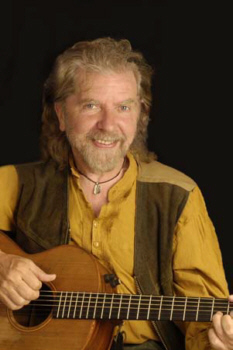
Tommy Sands
Tommy Sands was born in the right place. Although his Irish homeland was split by political and religious factions and bloodied by internal terrorism, Tommy and his four siblings grew up in a fairly isolated area of County Down in Northern Ireland on a farm where neighbors of differing affiliations would congregate to sing, dance and play music. The surrounding “us or them” prejudice was missing from their upbringing.
Surrounded by traditional Celtic music in a family where everyone sang and played, Tommy’s first instrument as a child was the fiddle, since “there was always one in the house” (his dad and six uncles fiddled, his mom played the accordion). “When the first guitar arrived in our house,” Sands remembers, “my father looked at it suspiciously and asked, ‘Where’s the bow?’"
Tommy, his brothers Colum, Eugene (Dino), Ben, and sister Anne, started playing house concerts and in local halls and pubs while still young, and in their teens were performing as The Sands Family further afield in Dublin and elsewhere. Tommy had already begun writing his own songs by age 10, based on traditional melodies and inspired by local events, and the group performed them alongside Celtic standards.
After Tommy left to study theology and philosophy in college 120 miles distant, he missed performing with his family, dropped out of school, and headed home. By coincidence, he hadn’t walked far before his brothers and sisters appeared in a car to whisk him off to rejoin them in a concert they were performing. Gaining confidence from the international acceptance of The Clancy Brothers and Tommy Makem and their very Irish repertoire, The Sands Family was soon spreading its music in larger and larger venues. Their prize for winning a national ballad contest was a three-week trip to perform in New York City in 1971. The group remained in the US for the next six months (a subsequent tour included a St. Patrick’s Day concert at Carnegie Hall), then expanded their following in Europe, establishing themselves as an international attraction in Russia, Germany and elsewhere.
At the peak of their popularity in 1975, a year in which they released three albums, brother Dino was killed in a car accident. His surviving brothers and sisters continued to perform but scaled back considerably on their touring and recording. For the next decade, Tommy’s life was occupied by The Sands Family work, starting his career as a professional solo musician – writing songs and touring alone – and hosting the popular “Country Ceili” program broadcast weekly on Belfast’s Downtown Radio (a show he emcees to this day).
Tommy’s first solo album, 1985’s Singing of the Times, contained classic original songs “There Were Roses” and “Daughters and Sons,” which were eventually recorded by Joan Baez, Kathy Mattea, and The Dubliners, among others. His next record, 1988’s Down by Bendy’s Lane: Irish Songs and Stories for Children, marked the recording debut of his children, son Fionán and daughter Moya, neither yet ten. After two more records that alternately featured traditional and original material, 1995’s The Heart’s a Wonder contained “The Music of Healing,” a key song in the sociopolitical changes of modern Ireland. Co-written and performed by Sands and close friend Pete Seeger, with lyrics urging hope, peace and unity, the song was called “an important anthem for our time and our land” by British Minister of Parliament and Nobel Peace Prize winner John Hume. Frustrated at the ongoing violence and lack of progress in peace talks, Sands organized a “Citizens Assembly” in Belfast in 1996 that invited creative artists and members of all political parties and religious groups to attend and discuss ways to start meaningful negotiations; “The Music of Healing” became the theme song of the gathering and of subsequent events.
“The Music of Healing” also marked the first collaboration between Sands and Bosnian cellist Vedran Smailovic, who had become a worldwide symbol of hope and courage when he performed by himself in 1992 at the still-under-fire site of a bomb that killed 22 people in Sarajevo. Sands and Smailovic, both citizens of broken homelands, went on to record the title track for Appleseed’s first tribute to the music of Pete Seeger, 1998’s Where Have All the Flowers Gone, and the remarkable Sarajevo/Belfast CD, a folk/classical/world music fusion of yearning, healing music that included guests Pete Seeger and Joan Baez, released by Appleseed in 1999.
Let the Circle be Wide is Sands’ first CD since his 2001 Christmas release, To Shorten the Winter, but he’s hardly been inactive. Aside from his crowded international touring schedule, annual Sands Family reunion performances, and his radio show, he’s involved in peace concerts, lectures and education programs for students and underprivileged young prisoners in the US, Israel, Palestine, Canada, Cuba and elsewhere. Those who want to read more about this remarkable, exuberant, world-changing musician are directed to his autobiography, The Songman – A Journey in Irish Music (2005).

|


